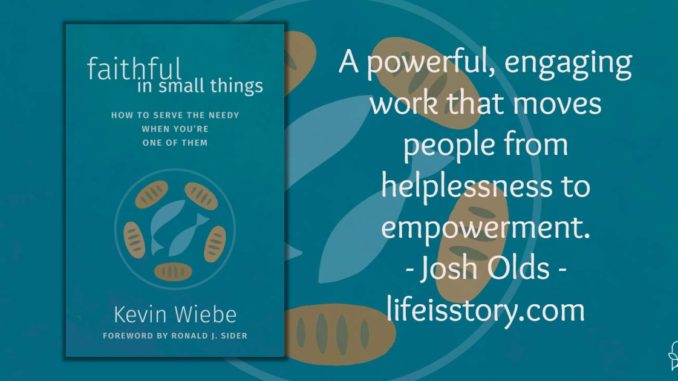
Published by Herald Press on March 16, 2021
Genres: Non-Fiction, Christian Life
Buy on Amazon
Goodreads
How can you help the poor when you can barely pay your own bills?
Pastor Kevin Wiebe grew up below the poverty line, with his mother hunting for change in the couch to buy food for the baby. Wiebe now pastors a “low-resource” church of mostly immigrants—a congregation that transcends definitions of the helper and the helped and that doesn’t fit neatly into any stereotype of poverty. In Faithful in Small Things, Wiebe shows readers that writing big checks isn’t the only—or even the best—way to alleviate poverty. Along the way, he shines a spotlight on the value of small acts of love as a means of changing the world, and as vitally important to following Jesus.
Investigating scriptural definitions of poverty and God’s heart for the poor throughout the Bible, Wiebe calls readers not only to “help the needy” but to acknowledge their own need and to work with God to serve others. By delving into concepts like brokenness, mutuality, dignity, and systemic injustice, Wiebe exposes gaps in the mainstream Christian understandings of economic inequality and explores holistic ways of reducing poverty. In doing so, he provides a better way forward for Christians committed to working for the flourishing of all. Jesus ministered to the poor, Jesus was poor. If both are true of our Savior, both can be true of us too.
According to a recent CNBC poll, nearly 2/3rd (63%) of Americans are living paycheck-to-paycheck. More people than ever need financial help and fewer people than ever seem to be in a position to help. Many have turned inward, able to focus only on caring for themselves, and forced to ignore the many people who could use a bit of help. But what if that feeling of helplessness is only because we haven’t truly understood how to help our neighbor? What if there were ways of serving those in need while being a person in need? You can, and that’s the premise of Faithful in Small Things by Kevin Wiebe.
Kevin is the pastor of New Life Christian Fellowship in Ontario, Canada. I first ran across him when he published a small group series called Pov.Ology, a six-week video series about poverty, theology, and the church. It was an eye-opening experience for my mostly upper-middle-class high school youth group. Faithful in Small Things shows that this interest in poverty alleviation and advocating for the poor is more than a passing interest but a core piece of Wiebe’s ministry.
Faithful in Small Things is written to the average person, just getting by or struggling, living in a society where public adulation for giving goes to those who have the most and give the most. When society tells you that your contributions can only be meager and that meager contributions are not valuable, it can quite quickly become disillusioning to even try to give. Western society is set up in a way that honors, in focused on, and runs through big givers. Wiebe counters that philosophy in his book, using personal anecdotes and thoughtful strategies to show how those in need can use what they have to help others in need and how that model of mutual giving builds the kind of community the early church envisioned.
Wiebe divides the book into four parts, with the first two dealing with understanding poverty biblically and sociologically and the second two dealing with poverty alleviation. In an era of health-and-wealth prosperity Gospel teaching, much of what Christian culture implicitly thinks about poverty and wealth is, frankly, flat-out wrong. Wiebe is able to take readers on a well-structured introduction to the underlying causes of poverty and highlighting the human element.
The strongest exhortation in the book is the simple truth that poverty alleviation works best when it comes from the community. When the poor are able to create community, advocate for themselves, and lead their own movements against economic injustice, it is more effective. This relational aspect toward poverty relief means that the people best suited toward advocating for economic justice are the poor themselves—which means that Jesus may be calling us to be poor ourselves, modeling his own incarnational ministry.
In an era where many people don’t feel like they have enough to help, Faithful in Small Things gives readers a blueprint for serving those in need when you are a person in need—and even suggests that this model is the most effective and reflects the Kingdom of God. It’s a powerful, engaging work that moves people from helplessness to empowerment.
